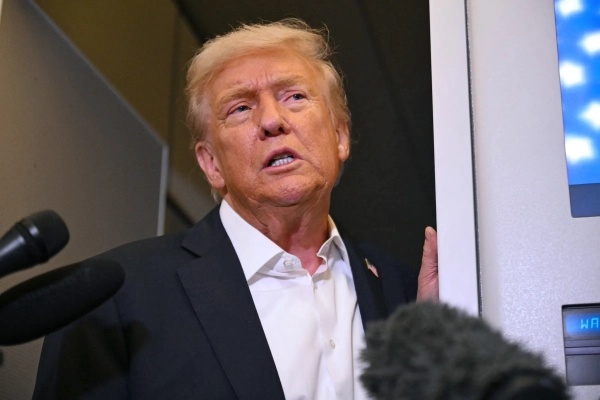
Canada recently designated the Proud Boys, a far-right hate group, as a terrorist organization, a move that has put pressure on President Joe Biden’s administration to take similar punitive action against the group and others who participated in January 6 attack on the US Capitol.
The Congressional Research Service has asserted that the Capitol insurrection was an act of domestic terrorism, as defined by federal regulations and law. The FBI has identified the criminal activity by the Proud Boys as a domestic terrorism threat.
But while the federal government maintains a list of foreign terrorist organizations, it does not have a mechanism to formally designate domestic terrorist organizations. National security experts argue that creating one would not only invite legal challenges, but would do little to improve law enforcement’s response to the nascent threat of domestic terrorism.
Creating such a list would raise legitimate First Amendment concerns because it could potentially be used to target political dissidents on both the left and the right. Experts also say it’s ill-suited to address the kind of domestic terrorist attacks and plots that the US is facing, which according to the Department of Homeland Security, primarily come from right-wing extremists acting as individuals, rather than as organized groups.
The best way forward, they say, is for the federal government to better employ existing tools to combat domestic terrorism — a threat that was not prioritized by former President Donald Trump, who repeatedly refused to denounce white nationalists and told those who stormed the Capitol, “We love you.”
“Violent white supremacists are not a new problem,” Faiza Patel, the director of liberty and national security at the Brennan Center for Justice, said. “Law enforcement has dealt with them before and can do so again. The FBI’s robust response to the attack on the Capitol shows that these groups can be investigated and prosecuted under existing law, undercutting any argument for new tools.”
Designating domestic terrorist groups wouldn’t help address the threats the US is facing
The US government has a system for designating foreign terrorist organizations. But the model doesn’t translate easily to domestic terrorists.
Under federal immigration law, the State Department can designate foreign terrorist organizations (FTOs), allowing it to impose sanctions against those who support the groups, prevent their members from entering the US, and deport those who have already reached American soil. Under a George W. Bush-era executive order, the State and Treasury departments can also designate “specially designated global terrorists,” or SDGTs, enabling them to block the assets of individuals and entities that are associated with those groups.
Those mechanisms work well to combat terrorist groups with discrete leadership and membership structures. But the biggest domestic terrorist threats come from groups that are decentralized by design and from individual extremists acting alone, Catrina Doxsee, a research associate at the Center for Strategic and International Studies (CSIS), said.
“We really have these loose networks largely connected more just by ideology and inspiration than by formal structure. And we have individual actors largely inspired by one another but not connected in formal groups,” she said. “We’ve seen especially a lot of inspiration coming from manifestos, particularly after mass shootings.”
A number of white nationalist groups, such as Aryan Nations and Hammerskin Nation, have embraced “leaderless resistance,” a strategy popularized by the prominent white nationalist Louis Beam in the 1990s, in an effort to evade government infiltration and prosecution. They have radicalized individuals online who have acted as lone wolves in carrying out terrorist acts that are difficult for law enforcement to disrupt because they alone know of their plans.
Since these groups have such a large footprint in the US, traditional law enforcement methods are actually “effective in responding to the threat they pose,” Patel said.
Creating a domestic terrorist designation would raise legal concerns
A domestic terrorist designation could be used to clamp down on political dissidents and suppress demonstrations, potentially infringing on free speech rights.
Trump, for example, sought to designate antifa as a terrorist organization, despite the fact that it is “hardly an organized group,” Patel said.
“This would criminalize all those who supported the movement — regardless of whether they were involved in violence,” she said. “Criminalizing support for groups comes perilously close to prohibiting membership, which would not stand under First Amendment law.”
It could also be used against groups in racial or ethnic minorities and the LGBTQ community, who have been disproportionately targeted by law enforcement and have also been most likely to be targeted in terrorist attacks because of their identity, according to CSIS’s data.
“Not only are you potentially harming already marginalized groups, you’re potentially also harming people who are being targeted by a lot of these terrorist attacks, and really kind of acting counterproductive to what you’re aiming to do,” Doxsee said.
It’s not clear who or what agency would decide which domestic groups should be designated as terrorist organizations. If the US were to implement such a mechanism, it’s likely that the Department of Justice would be involved, Doxsee said. But there would need to be clear, objective criteria for which organizations should be designated — otherwise, it would likely raise due process concerns without transparency into how the decision is being made or an opportunity to challenge the designation.
“Especially in this very politicized environment, and with the increasingly politicized nature of terrorism analysis, it would be very easy for a US administration to potentially invite partisan abuse of this kind of designation,” Doxsee said. “Any response to domestic terrorism really needs to be data-driven and based on as objective of standards as possible to ensure domestic security and safety and to avoid increased politicization.”
The US should refocus resources on domestic terrorism instead
Rather than creating a new mechanism to formally identify domestic terrorist groups, law enforcement could put more resources toward using existing legal authorities to prevent terrorist attacks and prosecute those responsible.
Law enforcement has been operating in a post-9/11 paradigm where “radical Islamic terrorism” was considered the biggest threat and demanded the most resources. After the 2017 “Unite the Right” rally in Charlottesville, Virginia, Trump ignored his advisers’ pleas to reevaluate his administration’s response to the domestic terrorism — and was reluctant to even use the phrase “domestic terrorism” to describe the threats the US was facing. He later redirected resources away from combating domestic terrorism and toward addressing “radical Islamic terrorism” instead.
As a result, less than a quarter of the FBI’s counterterrorism field agents were investigating domestic plots in 2019. By October 2020, DHS had identified white supremacists as the deadliest terror threat facing the country.
With the Biden administration receptive to prioritizing the threat posed by right-wing extremists, law enforcement agencies are no longer fighting an uphill battle. They can now mobilize under existing law and use models of penetrating jihadist groups like al-Qaeda or ISIS to hone their ability to combat domestic terrorism.
“What we really need isn’t to create a new authority or structure for turning our counterterrorism attention domestically, but it’s to invest the sort of time, energy and resources on the threat that we see in the United States that up to this point, was focused on jihadist organizations,” Doxsee said.
Part of that involves improved countering of online activity. While domestic terrorists are still largely acting individually and not as a discrete group, they are communicating on anonymous online forums and getting direct inspiration from those communities.
The federal government could also rely on data to determine where to allocate resources to combat domestic terrorism. CSIS has compiled a database of all domestic terrorist plots and attacks dating back to January 1994, identifying the perpetrators, their ideologies, the location of the attacks, the types of targets, and types of weapons used. But the federal government has no such database of its own — or at least one that is publicly available.
“Law enforcement already has the capability to do this,” Doxsee said. “It’s just about giving them the training and the resources to do it in a different context.”
Help keep Vox free for all. Make a contribution today.
Sourse: vox.com






